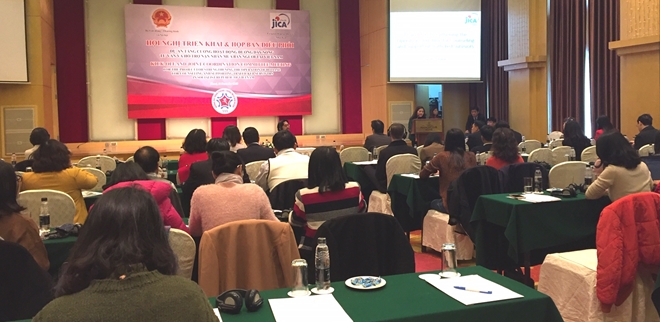JICA to continue supporting Vietnam with anti-human trafficking
The kick off meeting of the Project for “Strengthening the Operation of Hotline for Counselling and Supporting Trafficked Survivors” (Project Phase II) was held in Hanoi on December 14. This is a Technical Cooperation Project between the Japan International Cooperation Agency (JICA) and the Ministry of Labor, Invalids and Social Affairs (MOLISA).
- Government Office, JICA cooperate in building e-Government
- JICA’s training program for young leaders of Vietnam
- President asks for JICA support in key areas
Presented at the meeting were MOLISA Vice Minister Nguyen Thi Ha, JICA Senior Representative Mr. Ryutaro Kobayashi, representatives from other relevant ministries, international NGOs, UN organizations and concerned staff of the Hotline’s Operation Centers.
In continuation and inheritance of the Project Phase I for “Establishment of Anti-Trafficking in Person (TIP) Hotline” (2012-2016) which has expanded the existing Child Help Hotline operated in Hanoi, An Giang and Ha Giang provinces, in order to include a function as a hotline for anti-TIP and strengthen the operation of the hotline.
 |
In the Project Phase II (11- 2018-11-2021), the Hotline connecting unit in An Giang and the newly established in Da Nang city will be upgraded into higher level of regional call centers which, together with the existing one in Hanoi, are expected to enhance the counselling on anti-human trafficking in the South, Central and North regions, and boost up the complete support for trafficked victims.
Specifically, under the 2nd phase of the Project, JICA will support to equip necessary facilities of the call centers, strengthen the capacity of the counsellors, and enhance the inter-agency coordination among the Hotline’s operational centers, MOLISA, the Police, the Women’ Union etc. in providing support to victims; and communication activities to advocate for the new Hotline number 111.
From December 2017, the new number 111 has been active in parallel with the existing number 18001567, operating free of charge 24hours / 7days. Furthermore, the counsellors of these centers, who have a degree in social studies or psychology, are under MOLISA’s management and training which would help to ensure the required expertise.
Since October 2013 when the anti-TIP Hotline activated up to the end of November this year, the Hotline has received 13,627 calls in total. According to the latest analysis, 17% calls from relatives and friends of victim and 4.32 % calls from victims themselves.
In 2018, referral calls amounted to 25 cases, in which, 16 cases were referred to Police and NGO for rescues and investigation, 5 cases were finding missing person and 4 cases were from returned traffickers.
Social impact of the project is considered extremely important because the Hotline can provide information related to TIP, refer to the Police suspected cases for investigation as well as connect to competent agencies in supporting returned victims.

